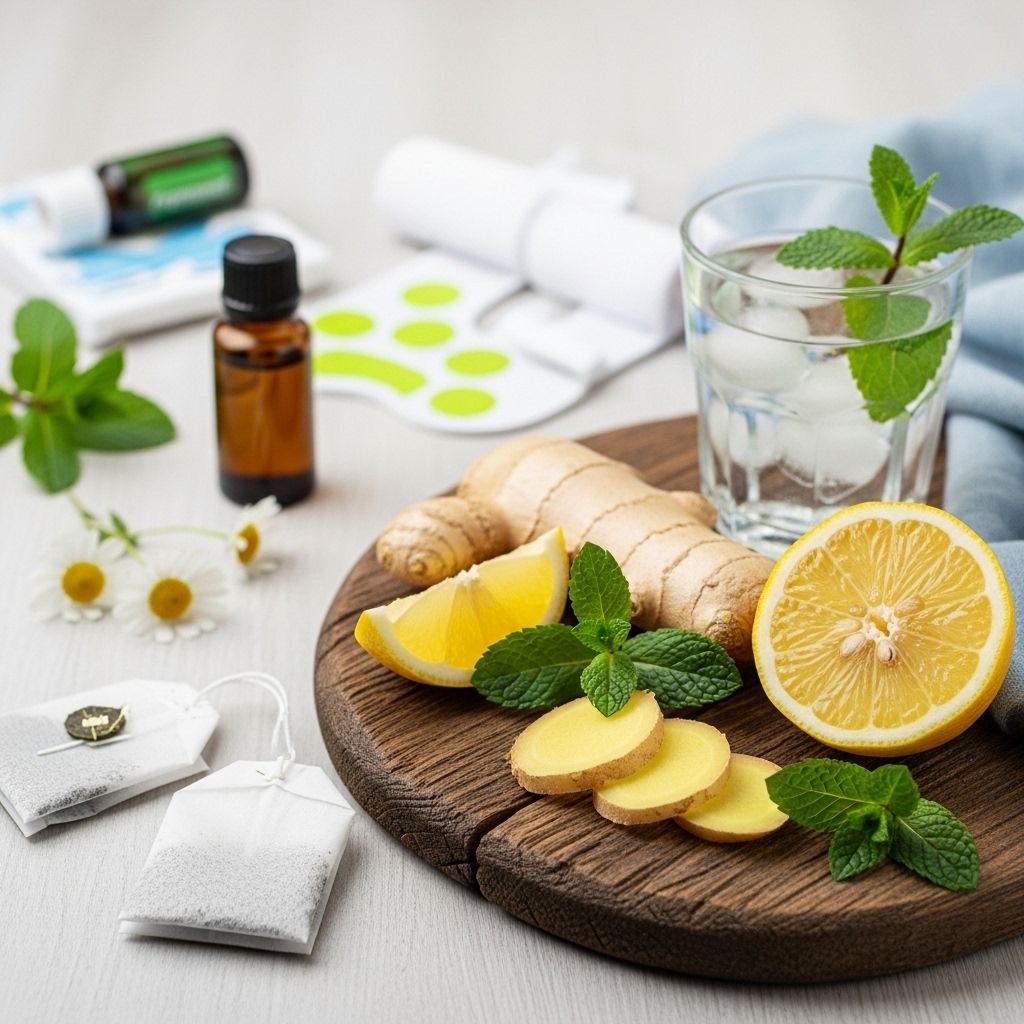9 Effective Home Remedies for Motion Sickness Relief
Harness simple kitchen ingredients to keep nausea at bay during every journey.

Motion sickness, also known as travel sickness, is a common condition that can strike anyone during a journey in a car, plane, boat, or amusement park ride. Characterized by nausea, dizziness, vomiting, and general discomfort, motion sickness can quickly turn an enjoyable trip into a distressing experience. While medication is available, many people prefer natural solutions to prevent or alleviate motion sickness. Explore these nine effective home remedies and lifestyle tips to help keep your travels comfortable and symptom-free.
Table of Contents
- Raw Ginger
- Essential Oils
- Lemon
- Pickle Juice
- Vitamins
- Chamomile Tea
- Licorice Root
- Stay Hydrated
- Black Horehound
- Additional Tips for Preventing Motion Sickness
- Frequently Asked Questions
1. Raw Ginger
Ginger has stood the test of time as a reliable remedy against motion sickness. Its active ingredients, including gingerol, have been associated with reducing nausea and vomiting. The exact mechanism is not entirely understood, but studies and anecdotal evidence support ginger’s anti-nausea effects.
- You Will Need: 1 inch of peeled ginger root
- How to Use: Bring an inch of peeled ginger with you while traveling. Suck or chew on a small piece whenever you start your journey or feel the onset of symptoms.
- How Often: Use as needed during long journeys.
- Why It Works: Gingerol and the spicy compounds stimulate digestion and help quell queasiness, making it one of the best natural options for motion sickness relief.
2. Essential Oils
Certain essential oils—particularly peppermint and ginger oil—are valued for their potent aromas and soothing properties. They can provide both psychological and physical relief from motion sickness symptoms.
Peppermint Oil
- You Will Need: 2-3 drops of peppermint oil and a handkerchief.
- How to Use: Place a few drops on your handkerchief and inhale the aroma whenever you travel or feel nauseated.
- How Often: Use as needed throughout your trip.
- Why It Works: Peppermint contains menthol, known for digestive support and its fresh, calming scent that helps inhibit the urge to vomit and eases an upset stomach.
Ginger Oil
- You Will Need: 2-3 drops of ginger oil and a handkerchief.
- How to Use: As with peppermint oil, add drops to a handkerchief and inhale gently when symptoms arise.
- How Often: Use during travel or whenever you are prone to motion sickness.
- Why It Works: Ginger oil shares many benefits of raw ginger, carrying antiemetic (anti-nausea) and calming effects.
3. Lemon
Lemon is another accessible remedy, especially valued for its refreshing citrus scent and flavor. The acidity may help neutralize stomach acids, while the aroma reduces feelings of nausea.
- You Will Need: 1 fresh lemon
- How to Use: Slice or simply carry a lemon slice with you. Suck on the slice or sniff the peel when queasy. Alternatively, add fresh lemon juice to water for a soothing beverage during travel.
- How Often: Use whenever early symptoms occur.
- Why It Works: The tartness and bright scent of lemon can cut through nausea and offer instant relief.
4. Pickle Juice
Pickle juice is a traditional remedy that restores electrolytes and helps settle stomach upsets caused by motion sickness. Its salt content may also prevent dehydration.
- You Will Need: Small quantity of pickle juice
- How to Use: Sip on a tablespoon or so of pickle juice during travel, especially if you begin to feel nauseated.
- How Often: As needed.
- Why It Works: Pickle juice acts as an instant electrolyte replacement and may help reduce nausea by balancing fluids in the body.
5. Vitamins
Some research and anecdotal evidence suggest certain vitamins help reduce motion sickness symptoms:
- Vitamin B6: Linked to alleviating nausea in general, especially in forms like pregnancy- or medication-related queasiness. May help with motion sickness as well.
- Vitamin C: Its antioxidant properties can reduce the production of histamine involved in motion sickness.
Consult your healthcare provider before starting any supplements, especially if you have other medical conditions or are on medication.
6. Chamomile Tea
Chamomile tea is renowned for its calming, anti-inflammatory, and mild sedative effects. It is particularly useful if motion sickness is accompanied by anxiety or tension.
- You Will Need: 1 teaspoon of chamomile flowers/tea, 1 cup of water
- How to Use: Boil the water, add chamomile tea, simmer 5-7 minutes, strain, cool slightly, and sip.
- How Often: Before or during travel, or at the onset of symptoms.
- Why It Works: Chamomile calms the digestive tract, relieves anxiety, and reduces the urge to vomit, promoting overall relaxation.
7. Licorice Root
Licorice root tea is celebrated in traditional medicine for its digestive and anti-inflammatory benefits, making it a valuable addition for people prone to travel-related stomach upset.
- You Will Need: 1 teaspoon dried licorice root, 1 cup water
- How to Use: Bring water to a boil, add licorice root, simmer 5 minutes, strain, cool, and drink as needed.
- How Often: Use only when required, not continuously, to avoid potential side effects of excess licorice.
- Why It Works: Licorice soothes the stomach, reduces inflammation, and may lessen both nausea and indigestion.
8. Stay Hydrated
Proper hydration is crucial during travel. Dehydration can worsen symptoms of motion sickness, including headache and lightheadedness. Plain water, seltzer, or diluted electrolyte beverages are best for maintaining fluid balance.
- How to Use: Drink small, steady sips of water before and during your journey. Avoid caffeinated, alcoholic, or overly sweetened beverages that could aggravate nausea.
9. Black Horehound
Black horehound is an herb sometimes used in candies or lozenges to lessen motion-induced nausea. Traditionally, its compounds are thought to act on the digestive and nervous systems, providing a mild antiemetic effect.
- You Will Need: Black horehound tea, lozenges, or candies
- How to Use: Suck on lozenges or sip black horehound tea at the first sign of nausea.
- How Often: As required, ensuring you are not allergic to the herb.
- Why It Works: Black horehound may help calm the digestive tract and reduce motion-triggered queasiness.
Additional Tips for Preventing and Managing Motion Sickness
Besides these natural remedies, several habits and travel practices can make a significant difference:
- Maintain Focus: Keep your eyes fixed on a point in the distance or look in the direction of travel.
- Choose the Right Seat: Sit in the front seat of a car, over the wing in an airplane, or at the middle of a boat, where motion is least pronounced.
- Fresh Air: Ensure proper ventilation—open a window, sit by an air vent, or take fresh air breaks when possible.
- Avoid Heavy Meals: Eat light, non-greasy foods before traveling. Avoid spicy, fried, or fatty foods that upset the stomach.
- Try Plain Snacks: Light snacks like crackers can absorb stomach acids and help settle your stomach.
- Limit Visual Distractions: Don’t read or focus on screens for long periods while in motion.
- Practice Relaxation Breathing: Deep breathing exercises can help divert focus away from nausea and reduce anxiety.
- Use Wrist Acupressure Bands: Accupressure bands pressed on the P6 point (inner wrist) may help relieve symptoms for many travelers.
Frequently Asked Questions (FAQs)
Q: Can children use these home remedies for motion sickness?
A: Most remedies such as ginger, lemon, and hydration are safe for children in moderation, but always consult a pediatrician before using herbal remedies or essential oils for younger kids.
Q: Is it safe to use ginger daily for motion sickness?
A: For occasional use, ginger is typically safe. However, excessive intake may cause heartburn or interact with medications. Use it as needed and consult your doctor if you have health concerns.
Q: How soon before travel should I begin these remedies?
A: It’s best to begin home remedies like ginger, chamomile tea, or essential oils 15-30 minutes before travel, and repeat as required during your journey.
Q: Are there side effects associated with herbal remedies like licorice root or black horehound?
A: Licorice root, if used excessively, can cause high blood pressure or interact with some medications. Black horehound should be avoided by pregnant people. Always use herbs with caution and consult your healthcare provider if you are on medication or pregnant.
Q: What should I do if motion sickness persists despite home remedies?
A: If motion sickness is severe, persistent, or worsens despite using natural remedies, seek advice from a healthcare professional. They may recommend medication or further evaluation.
Conclusion
Managing motion sickness naturally requires a combination of dietary changes, aromatic therapies, hydration, and smart travel habits. Remedies such as ginger, essential oils, and herbal teas offer convenient relief for most people. However, it is important to listen to your body, start with remedies well before the journey begins, and seek medical guidance for severe or chronic symptoms. Safe travels!
References
- https://www.stylecraze.com/articles/effective-home-remedies-for-motion-sickness/
- https://www.tomsofmaine.com/blogs/natural-products/11-natural-remedies-for-motion-sickness
- https://www.stylecraze.com/articles/how-to-stop-nausea-with-reflexology/
- https://www.sailogy.com/en/blog/natural-remedies-for-seasickness/
- https://www.youtube.com/watch?v=Ww3gUjMUDPA
- https://www.mayoclinic.org/first-aid/first-aid-motion-sickness/basics/art-20056697
Read full bio of medha deb












